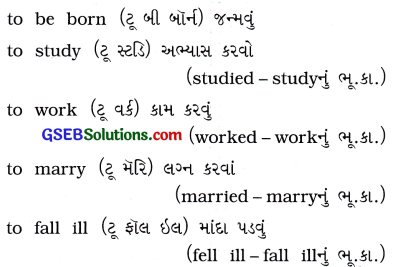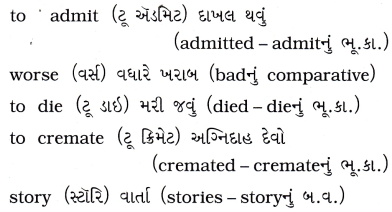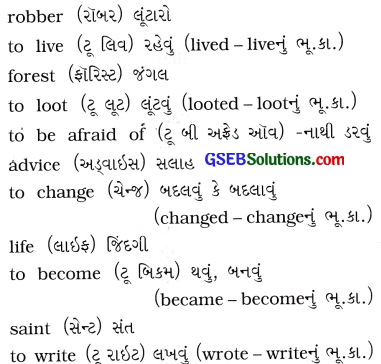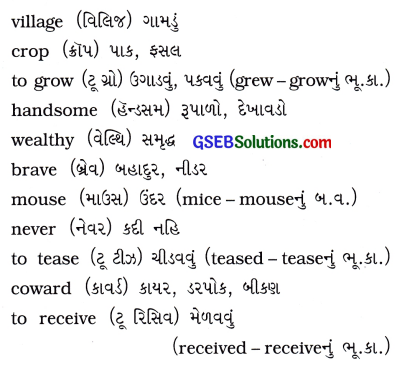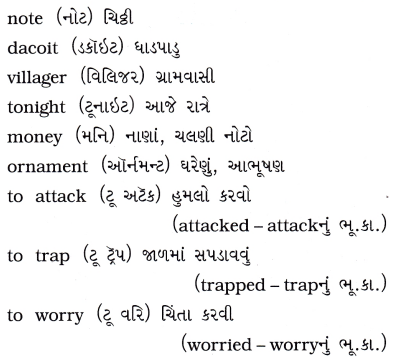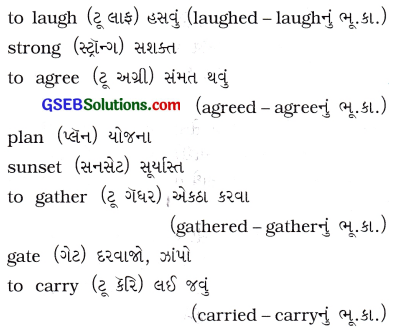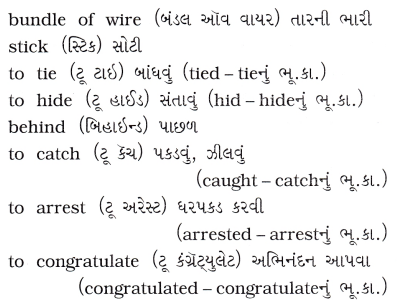Gujarat Board GSEB Solutions Class 6 English Second Language Sem 1 Unit 3 Fought and Won Textbook Exercise Questions and Answers.
GSEB Std 6 English Textbook Solutions Sem 1 Unit 3 Fought and Won
GSEB Class 6 English Fought and Won Text Book Questions and Answers
Activity 1.
નીચેનું કાવ્ય સાંભળો, ગાઓ અને વાંચો :
Madan Manchur
Born at Janakpur
Studied at Gyanpur
Worked at Karmpur
Married at Jivanpur
Fell ill on Friday
Admitted on Saturday
Worse on Monday
Died on Tuesday
Cremated on Wednesday
This was the story
of Madan Manchur.
![]()
ભાવાનુવાદ
(મદન મન્ચર) મદન મન્ચર
(બૉર્ન ઍટ જનકપુર) જનકપુરમાં જન્મ્યો |
(સ્ટડિડ ઍટ ગ્યાનપુર) જ્ઞાનપુરમાં અભ્યાસ કર્યો
(વટ ઍટ કર્મપુર) કર્મપુરમાં કામ કર્યું
(મૅરિડ ઍટ જીવનપુર) જીવનપુરમાં લગ્ન કર્યા
(ફેલ ઇલ ઑન ફ્રાઈડે) શુક્રવારે માંદો પડ્યો
(ઍડમિટિડ ઑન ઍટ) શનિવારે
(હૉસ્પિટલમાં) દાખલ કર્યો (વર્સ ઑન મન્ડે) સોમવારે
(તબિયત) વધારે બગડી |
(ડાઇડ ઑન ટ્યૂઝ3) મંગળવારે મરણ પામ્યો |
(ક્રિમેટિડ ઑન વે) બુધવારે અગ્નિદાહ કર્યો |
(ધિસ વૉઝ ધ સ્ટૉરિ) એવી આ વાર્તા હતી
(ઑવ મદન મન્યુર.) મદન મન્સુરની.
Teacher’s Note : અને ગવડાવવું. તેનો ભાવાર્થ સમજાવવો. તેમાં રહેલા જનકપુર, જ્ઞાનપુર, કર્મપુર, જીવનપુર જેવા શબ્દોમાં સૂચિત થતો અર્થ સમજાવવો. અઠવાડિયાના વારનાં નામ પણ તૈયાર કરાવવા.
નીચે આપેલા શબ્દો જેવા શબ્દો કાવ્યમાંથી શોધીને લખો :
| studied | Monday | Janakpur | |
| worked | Tuesday | Gyanpur | Madan, Manchur |
| married | Wednesday | Karmpur | born at |
| admitted | Friday | Jaipur | fell ill, on |
| died | Saturday | story, of | |
| cremated | worse, was |
Activity 2.
તમારા શિક્ષક પાસે વારાફરતી જાઓ. તેઓ જે ચિટ્ટી આપે તે ક્રિયા (અથવા મૂક અભિનય) કરો. તમે કઈ ક્રિયા કરી તે તમારા મિત્રોને ઓળખવા દો :
Teacher’s Note : નીચે ઉદાહરણમાં દર્શાવ્યા પ્રમાણેની બીજી ચિઠ્ઠીઓ બનાવવી. વિદ્યાર્થીઓને એક પછી એક બોલાવવા અને કોઈ એક ચિઠ્ઠી ઉપાડવા કહેવું. ચિઠ્ઠીમાં દર્શાવ્યા પ્રમાણેની ક્રિયા કરવાનું તેને કહેવું અને બીજા વિદ્યાર્થીને ઉદાહરણમાં દર્શાવ્યા પ્રમાણે વાક્યો બોલવા કહેવું. પહેલાં તમારે પણ તે ક્રિયા કરી બતાવવી.
![]()
(1) Write your name on the black-board.
(2) Read English textbook.
(3) Tell a story.
(4) Sing a bhajan.
(5) Clap your hands.
(6) Give your pen.
(7) Clean the blackboard.
(8) Play cricket.
(9) Open the window.
(10) Draw a picture.
વિદ્યાર્થીઓ ચિઠ્ઠીમાંની સુચના પ્રમાણે ક્રિયા કરશે અને નીચે ઉદાહરણમાં દર્શાવ્યા પ્રમાણે બીજાં વાક્યો બોલશેઃ
(a) Amir played cricket.
Jaya sang a song.
(b) Amir : I played cricket.
Jaya : I sang a song.
Activity 3.
તમે વાલિયા લૂંટારાની વાર્તા જાણો છો. અહીં વાલિયા વિશે થોડાં વાક્યો આપ્યાં છે, તથા કૌસમાં કેટલાક શબ્દો આપ્યા છે; એમાંથી યોગ્ય શબ્દ પસંદ કરી ખાલી જગ્યા પૂરો :
Valia was (was / were) a robber. He lived (live / lived) in a forest. He looted (loot / looted) people. So people were (was / were) afraid of him. His family was (was / were) not happy with him. Once, Narad Muni passed (passed /pass) through the forest. His advice changed (change / changed) Valia’s life. Valia, the robber, became Valmiki, the saint. He wrote (write / wrote) the Ramayana.
Activity 4.
તમારા શિક્ષક વાર્તા વાંચી સંભળાવે ત્યારે પાઠ્યપુસ્તક બંધ રાખીને વાર્તા સાંભળો. તે પછી વાર્તા વાંચો અને તમારા મિત્રોને વાંચી સંભળાવો :
Birju, the Brave
There was a small village the mountains. The name of the village was Surajpur. There was a big forest all around Surajpur. People in Surajpur were happy. They worked hard and grew good crops.
Birju, a young man, also lived in Surajpur. He was tall and handsome. He was wealthy, too. But he was not brave. He was afraid of even a mouse. He never went out at night. The children ’teased him, “Birju, the Coward.”
![]()
Once the village sarpanch received a note from some dacoits. “We are coming to your village tonight. Keep all your money and ornaments ready.” The sarpanch called the villagers. He showed them the note. Some villagers wanted to attack the dacoits. Some others said, “We shall trap them.”
Birju was also there. He stood up and told the sarpanch, “Sir, don’t worry about the dacoits. I will teach them a lesson.” The Villagers laughed. The sarpanch said, “What! You will teach them a lesson ! Birju, you are afraid of even a small mouse.
How will you teach them a lesson ?” Birju replied, “Give me ten strong young men. I have a plan.” The sarpanch agreed. He asked ten strong young men to go with him.
After sunset, Birju and his friends gathered at the village gate. They carried a bundle of wire and sticks. They tied the wire to the trees across the road. Then they hid themselves behind the trees.
It was dark. They did not see anyone for a long time. Late at night the dacoits came on horseback.
They did not see the wire in the dark. One by one they fell down. Birju and his friends came out. They caught the dacoits and tied them to the trees. The next day the sarpanch called the police. The police arrested the dacoits. The sarpanch and the villagers congratulated Birju and his friends. Now Birju was not “Birju, the Coward”. He was “Birju, the Brave”.
(બિરજુ, ધ બ્રેવ) બહાદુર બિરજુ
(ધેઅર વૉઝ અ સ્મૉલ વિલિન ઇન ધ માઉન્ટિન્ટ. ધ નેમ ઑવ ધ વિલિજ વૉઝ સૂરજપુર. ધેઅર વૉઝ અ બિગ ફૉરિસ્ટ ઑલ અરાઉન્ડ સૂરજપુર. પીપલ ઇન સૂરજપુર વેઅર હૅપિ. ધે વટ હાર્ડ ઍન્ડ ગ્રૂ ગુડ ક્રૉસ.)
પહાડોમાં એક નાનું ગામડું હતું. ગામનું નામ સૂરજપુર હતું. સૂરજપુરની ચારે બાજુ મોટું જંગલ હતું. સૂરજપુરમાંના લોકો સુખી હતા. તેઓ ખૂબ મહેનત કરતા અને ખૂબ પાક પકવતાં. (બિરજુ, અ યન્ગ મૅન, ઑલ્લો લિલ ઇન સૂરજપુર. હી વૉઝ ટૉલ ઍન્ડ હૅન્ડસમ. હી વૉઝ વેલ્થિ, ટુ, બટ હી વૉઝ નૉટ બ્રેવ. હી વૉઝ અફ્રેડ ઑવ ઇવન અ માઉસ. હી નેવર વેન્ટ આઉટ ઍટ નાઇટ.
ધ ચિલ્ડ્રન ટીડ હિમ, “બિરજુ, ધ કાવર્ડ.’) બિરજુ, એક યુવાન, પણ સૂરજપુરમાં રહેતો હતો. તે ઊંચો અને દેખાવડો હતો. તે સમૃદ્ધ પણ હતો, પરંતુ તે નીડર (બહાદુર) ન હતો. તે એક ઉંદરથી પણ ડરતો. તે રાત્રે કદી બહાર જતો નહીં. બાળકો તેને ચીડવતાં, “ડરપોક બિરજુ.” (વન્સ ધ વિલિજ સરપંચ રિસિડ અ નોટ ફ્રૉમ સમ ડકૉઇટ્સ.)
એક વખત ગામના સરપંચને કેટલાક ધાડપાડુઓ તરફથી એક – ચિઠ્ઠી મળી.
![]()
(‘વી આર કમિંગ ટુ યુઅર વિલિજ ટુનાઇટ. કીપ ઑલ યુઅર મનિ ઍન્ડ ઑર્નમર્સ રેડિ.”) અમે આજે રાત્રે તમારા ગામમાં આવીએ છીએ. તમારાં બધાં નાણાં (ચલણી નોટો) અને ઘરેણાં તૈયાર રાખજો.” (ધ સરપંચ કૉલ્ડ ધ વિલિજઝ. હી દોડ ધેમ ધ નોટ) સરપંચે ગામલોકોને બોલાવ્યા. તેમણે તેઓને તે ચિઠ્ઠી બતાવી.
(સમ વિલિજઝ વૉન્ટિ, ટુ અટૅક ધ ડકૉઇટ્સ. સમ અધર્ઝ સેડ, વી શૈલ ટ્રેપ ધેમ.”) કેટલાક ગામલોકો ધાડપાડુઓ પર હુમલો કરવા ઇચ્છતા હતા. કેટલાક બોલ્યા, “આપણે તેઓને ફસાવીશું.” (બિરજુ વૉઝ ઑલ્સો ધેઅર. હી રૂડ અપ ઍન્ડ ટોલ્ડ ધ સરપંચ, “સર, ડોન્ટ વરિ અબાઉટ ધ ડકૉઇટ્સ.
આઈ વિલ ટીચ ધેમ અ લેસન.”) બિરજુ પણ ત્યાં હતો. તે ઊભો થયો અને સરપંચને કહ્યું, “સાહેબ, ધાડપાડુઓની ચિંતા કરશો નહિ. હું તેઓને બોધપાઠ શીખવીશ.” (ધિ વિલિજઝ લાટ.) ગામલોકો હસ્યા. (ધ સરપંચ સેડ, “વૉટ! યુ વિલ ટીચ ધેમ અ લેસન! બિરજુ, યૂ આર અફ્રેઇડ ઑવ ઇવન અ સ્મૉલ માઉસ. હાઉ વિલ યૂ ટીચ ધેમ અ લેસન?”) સરપંચે કહ્યું, “શું ! તું તેઓને બોધપાઠ શીખવીશ! બિરજુ, તું એક નાના ઉંદરથી પણ ડરે છે.
તે તેઓને કેવી રીતે બોધપાઠ શીખવીશ?” (બિરજુ રિપ્લાઇ, “ગિવ મી ટેન સ્ટ્રૉન્ગ યંગ મેન. આઈ હેવ અ પ્લેન.”) બિરજુએ ઉત્તર આપ્યો, “મને દસ સશક્ત યુવાન માણસો આપો. મારી પાસે એક યોજના છે.” (ધ સરપંચ અગ્રીડ. હી આડ ટેન સ્ટ્રૉન્ગ યંગ મેન ટુ ગો વિથ હિમ.) સરપંચ સંમત થયા. તેમણે દસ સશક્ત યુવાન માણસોને તેની સાથે જવા કહ્યું.
(આફટર સનસેટ, બિરજુ ઍન્ડ હિઝ ફ્રેન્ડ્ઝ ગેંધર્ડ ઍટ ધ વિલિજ ગેટ. ધે કૅરિડ અ બંડલ ઑવ વાયર ઍન્ડ સ્ટિક્સ. ધ ટાઇડ ધ વાયર ટુ ધ ટ્રીઝ અક્રૉસ ધ રોડ. ધેન ધે હિડ ધેમસેલ્થ બિહાઇન્ડ ધ ટ્રીઝ.) સૂર્યાસ્ત પછી બિરજુ અને તેના મિત્રો ગામના ઝાંપે ભેગા થયા. તેઓ તારનું ગૂંચળું (ભારી) અને સોટીઓ લાવ્યા. તેમણે રસ્તાની બંને બાજુનાં વૃક્ષો સાથે તાર બાંધ્યા. પછી તેઓ વૃક્ષોની પાછળ સંતાઈ ગયા.
(ઇટ વૉઝ ડાર્ક. ધ ડિડ નૉટ સી એનિવન ફૉર અ લૉન્ગ ટાઇમ. લેઇટ ઍટ નાઇટ ધ ડકૉઇટ્સ કેમ ઑન હૉર્સબૅક.) અંધારું હતું. તેઓએ લાંબા સમય સુધી કોઈને જોયા નહિ. મોડી રાત્રે ધાડપાડુઓ ઘોડેસવાર થઈને આવ્યા. (ધે ડિડ નૉટ સી ધ વાયર ઇન ધ ડાર્ક. વન બાઇ વન છે ફેલ ડાઉન. બિરજુ ઍન્ડ હિઝ ફ્રેન્ડ્ઝ કેમ આઉટ, ધ કૉટ ધ ડકૉઇટ્સ ઍન્ડ ટાઇડ ધેમ ટુ ધ ટ્રીઝ.) તેઓએ અંધારામાં તાર જોયો નહિ.
![]()
તેઓ એક પછી એક નીચે પડ્યા. બિરજુ અને તેના મિત્રો બહાર આવ્યા. તેઓએ ધાડપાડુઓને પકડ્યા અને તેઓને વૃક્ષો સાથે બાંધ્યા. (ધ નેકસ્ટ ડે ધ સરપંચ કૉલ્ડ ધ પલિસ. ધ પલિસ અરેસ્ટિડ ધ ડકૉઇટ્સ.) બીજા દિવસે સરપંચે પોલિસને બોલાવી. પોલિસે ધાડપાડુઓની ધરપકડ કરી.
Activity 5.
વાર્તાનું મૂકવાચન કરો. નીચે “A’માં આપેલા શબ્દોને “B’માં આપેલાં પદો સાથે જોડો :
| ‘A’ | ‘B’ |
| (1) forest | (1) Anjali called Lata ‘Laddu’. |
| (2) brave | (2) full of trees. |
| (3) agree | (3) Rakesh answered the question. |
| (4) tease | (4) Jayesh won 100m race. |
| (5) reply | (5) The police caught the thief. |
| (6) congratulate | (6) Jagruti went to the doctor at night. |
| (7) arrest | (7) Neha replied, “Yes”. |
(1) forest – full of trees.
(2) brave – Jagruti went to the doctor at night.
(3) agree – Neha replied. “Yes”.
(4) tease – Anjali called Lata ‘Laddu’.
(5) reply – Rakesh answered the question.
(6) congratulate – Jayesh won 100 m race.
(7) arrest – The police caught the thief.
Activity 6.
નીચેના શબ્દસમૂહો સાંભળો અને બોલી : પાઠમાં આ શબ્દસમૂહો ક્યાં આવેલા છે તે શોધો
(1) have a plan
(2) a bundle of wire
(3) tall and handsome
(4) received a note
(5) a very small village
(6) fell down
(7) late at night
(8) was afraid of
(9) teach a lesson
(10) worked hard
![]()
નોંધ : વિદ્યાર્થીઓએ આ શબ્દસમૂહો લખવા અને તેના અર્થ તૈયાર કરવા અને પાઠમાં શબ્દસમૂહો નીચે લીટી દોરવી.
નીચેના વાક્યો કોણ બોલે છે, કોને કહે છે તે લખો :
| No. | Sentences | Who | Whom |
| ( 1 ) | Keep your ornaments ready. | dacoits | villagers |
| (2) | Birju, the Brave. | writer | Birju |
| (3) | Tie the wire with the tree. | Birju | his friends |
| (4) | Birju, the Coward. | children | Birju |
| (5) | Give me ten strong young men. | Birju | Sarpanch |
| (6) | Congratulations, team Birju ! | Sarpanch and Villagers | Birju and his friends |
| (7) | You are afraid of even a mouse. | Sarpanch | Birju |
| (8) | Go with Birju and do as he says. | Sarpanch | strong young men |
| (9) | Come and arrest the decoits. | Sarpanch | police |
| (10) | Hide behind the trees. | Birju | his friends |
Activity 7.
નીચેના વિધાનોમાં સાચા વિધાન સામે True અને ખોટા વિધાન સામે False લખો :
Surajpur, February.
Birju caught the dacoits in Surajpur. Some dacoits sent a note to the village sarpanch day before yesterday. It was about the robbery. Sarpanch and villagers decided to fight with them. The young boy Birju, with ten young strong men took the challenge.
They tied wire to the trees across the road. The dacoits came on horseback. They did not see the wire. So they fell on the ground. Birju and the young men caught them. Police arrested the dacoits. Birju became the hero of the village.
(B) નીચેના શબ્દો ઓળખો અને લખો : (અરીસાનો ઉપયોગ કરો.)

![]()
Activity 10.
નીચેનું કાવ્ય સાંભળો, ગાઓ અને ગાઈ સંભળાવો :
Teacher’s Note : કાવ્ય ગાવું અને ગવડાવવું. વિદ્યાર્થીઓને ગાતાં બરાબર ફાવી જાય પછી to singl peut to speak, to read, to write વગેરે મૂકીને કાવ્ય ગવડાવવું અને વિદ્યાર્થીઓને જાતે ગાવા કહેવું. કાવ્યનો ભાવાર્થ સમજાવવો.
We shall all learn,
We shall all learn,
We shall all learn some day…
Oh, deep in my heart,
I do believe,
That we shall all learn some day …
We shall learn to sing,
We shall learn to sing,
We shall learn to sing some day…
Oh, deep in my heart,
I do believe,
That we shall learn to sing some day.
Let’s learn more
1. Read the following poem and answer the questions:
Madan Manchur
Born at Janakpur
Studied at Gyanpur
Worked at Karmpur
Married at Jivanpur
Fell ill on Friday
Admitted on Saturday
Worse on Monday
Died on Tuesday
Cremated on Wednesday
This was the story of Madan Manchur.
Answer the following questions :
Question 1.
Whose story is this ?
Answer:
This is the story of Madan Manchur.
Question 2.
Where was Madan Manchur born ?
Answer:
Madan Manchur was born at Janakpur.
Question 3.
When did he fall ill ?
Answer:
He fell ill on Friday.
Question 4.
When was he cremated ?
Answer:
He was cremated on Wednesday.
![]()
Answer the questions selecting the correct options
Question 1.
Where did Madan Manchur study ?
A. at Janakpur
B. at Karmpur
C. at Gyanpur
D. at Jivanpur
Answer:
C. at Gyanpur
Question 2.
Where did he marry ?
A. at Janakpur
B. at Karmpur
C. at Gyanpur
D. at Jivanpur
Answer:
D. at Jivanpur
Question 3.
When was he admitted ?
A. on Friday
B. on Saturday
C. on Monday
D. on Wednesday
Answer:
B. on Saturday
Complete the sentences selecting the correct options :
Question 1.
Madan Manchur was born at…
A. Janakpur.
B. Karmpur.
C. Jivanpur.
D. Gyanpur.
Answer:
A. Janakpur.
Question 2.
Madan Manchur worked at…
A. Janakpur.
B. Karmpur.
C. Jivanpur.
D. Gyanpur.
Answer:
B. Karmpur.
Question 3.
Madan Manchur died on …
A. Tuesday.
B. Friday.
C. Saturday.
D. Monday.
Answer:
A. Tuesday.
![]()
Question 4.
On Monday Madan Manchur was …
A. better.
B. good.
C. worse.
D. cremated.
Answer:
C. worse.
2. Read the following paragraphs from the lesson:
1. There was a small village in the mountains. The name of the village was Surajpur. There was a big forest all around Surajpur. People in Surajpur were happy. They worked hard and grew good crops. Birju, a young man, also lived in Surajpur. He was tall and handsome. He was wealthy, too. But he was not brave. He was afraid of even a mouse. He never went out at night. The children teased him, “Birju, the Coward.”
Answer the following questions :
Question 1.
What was the name of the village ?
Answer:
The name of the village was Surajpur.
Question 2.
What was there all around Surajpur ?
Answer:
There was a big forest all around Surajpur.
![]()
Question 3.
Who lived in Surajpur ?
Answer:
Birju, a young man lived in Surajpur.
Question 4.
What did children call Birju ?
Answer:
Children called Birju, “Birju, the Coward”.
Answer the questions selecting the correct options :
Question 1.
Where was the small village ?
A. on the sea-shore.
B. in the mountains.
C. on the riverbank.
D. in the desert.
Answer:
B. in the mountains.
Question 2.
Who was tall and handsome ?
A. Birju
B. Raju
C. Bholu
D. Sonu
Answer:
A. Birju
Complete the sentences selecting the correct options :
Question 1.
Birju was afraid of even a…
A. cat.
B. dog.
C. cockroach.
D. mouse.
Answer:
D. mouse.
Question 2.
Birju never went out…
A. at night.
B. in cold.
C. at noon.
D. in raining.
Answer:
A. at night.
![]()
Question 3.
People in Surajpur were happy, because …
A. they never fell ill.
B. they never quarrelled.
C. they worked hard and grew good crops.
D. they lived on a riverbank.
Answer:
C. they worked hard and grew good crops.
Question 4.
Birju was …
A. brave.
B. coward.
C. ill.
D. fat.
Answer:
B. coward.
(2) Once the village sarpanch received a note from some dacoits. “We are coming to your village tonight. Keep all your money and ornaments ready.” The sarpanch called the villagers. He showed them the note. Some villagers wanted to attack the dacoits. Some others said, “We shall trap them.” Birju was also there. He stood up and told the sarpanch, “Sir, don’t worry about the dacoits. I will teach them a lesson”.
Answer the following questions :
Question 1.
What did the village sarpanch receive ; from some dacoits?
Answer:
The village sarpanch received a note from some dacoits.
Question 2.
What did the dacoits ask the villagers to keep ready ?
Answer:
The dacoits asked the villagers to keep their money and ornaments ready.
Question 3.
What did some villagers want ?
Answer:
Some villagers wanted to attack the dacoits.
Answer the questions selecting the correct options :
Question 1.
Who called the villagers ?
A. the sarpanch
B. the dacoits
C. Birju
D. some villagers
Answer:
A. the sarpanch
Question 2.
What did some other villagers want ?
A. to kill the dacoits.
B. to trap the dacoits.
C. to give money to the dacoits.
D. to give ornaments to the dacoits.
Answer:
B. to trap the dacoits.
![]()
Question 3.
What did Birju want ?
A. to teach a lesson to the dacoits.
B. to fight with the dacoits.
C. to inform the police.
D. to give his wealth to the dacoits.
Answer:
A. to teach a lesson to the dacoits.
(3) After sunset, Birju and his friends I; gathered at the village gate. They carried ; a bundle of wire and sticks. They tied the wire to the trees across the road. Then they hid themselves behind the trees. It was dark. They did not see anyone ; for a long time. Late at night the dacoits came on horseback. They did not see the wire in the dark.
One by one they fell down. Birju and his friends came out. They caught the dacoits and tied them to the trees. The next day the sarpanch called the police. The police arrested the dacoits. The sarpanch and the villagers congratulated Birju and his friends. Now Birju was not “Birju, the Coward.” He was “Birju, the Brave.”
Answer the following questions :
Question 1.
Where did Birju and his friends gather after sunset?
Answer:
After sunset Birju and his friends gathered at the village gate.
Question 2.
What did they carry with them ?
Answer:
They carried a bundle of wire and sticks with them.
Question 3.
Where .did they hide themselves ?
Answer:
They hid themselves behind the trees.
Question 4.
When did the dacoits come on horseback ?
Answer:
The dacoits came on horseback late at night.
![]()
Question 5.
Who congratulated Birju and his friends ?
Answer:
The sarpanch and the villagers congratulated Birju and his friends.
Answer the questions selecting the correct options :
Question 1.
What did Birju and his friends tie to the tree ?
A. a rope
B. a wire
C. a ribbon
D. a string
Answer:
B. a wire
Question 2.
Who caught the dacoits ?
A. Birju and his friends
B. the villagers
C. police
D. the women
Answer:
A. Birju and his friends
Question 3.
Who arrested the dacoits ?
A. Birju
B. the sarpanch
C. the police
D. Raju
Answer:
C. the police
Complete the sentences selecting the correct options:
Question 1.
Birju and his friends gathered at the village gate…
A. before sunset.
B. after sunset.
C. after dinner.
D. at midnight.
Answer:
B. after sunset.
Question 2.
They carried …
A. a bundle of wire and sticks.
B. guns.
C. powder.
D. knives and swords.
Answer:
A. a bundle of wire and sticks.
Question 3.
The next day the sarpanch called …
A. a minister.
B. the police.
C. the principal.
D. Birju’s parents.
Answer:
B. the police.
Question 4.
Now Birju was …
A. “Birju, the Coward”
B. “Birju, the Brave”
C. “Birju, the Strong”
D. “Birju, the Winner”
Answer:
B. “Birju, the Brave”
![]()
3. Read the following paragraphs and answer the questions :
(1) Valia was a robber. He lived in a forest. He looted people. So, people were afraid of him. His family was not happy with him. Once Narad Muni passed through the forest. His advice changed Valia’s life. Valia, the robber, became Valmiki, the saint. He wrote the Ramayana.
Answer the following questions :
Question 1.
Who was a robber?
Answer:
Valia was a robber.
Question 2.
Where did he live ?
Answer:
He lived in a forest.
Question 3.
What did Valia do ?
Answer:
Valia looted people.
Question 4.
Was his family happy with him ?
Answer:
No, his family was not happy with him.
Question 5.
Whose advice changed Valia’s life ?
Answer:
Narad Muni’s advice changed Valia’s life.
Answer the questions selecting the correct options :
Question 1.
What was Valia ?
A. a hunter
B. a robber
C. a merchant
D. a giant
Answer:
B. a robber
Question 2.
Who passed through the forest ?
A. Buddha
B. Vivekanand
C. Narad Muni
D. Shivaji
Answer:
C. Narad Muni
![]()
Question 3.
What did Valia become ?
A. a saint
B. a teacher
C. a priest
D. a king
Answer:
A. a saint
Complete the sentences selecting the correct options :
Question 1.
Valia lived in a …………….
A. forest.
B. palace.
C. hut.
D. field.
Answer:
A. forest.
Question 2.
Valia looted …
A. children.
B. merchants.
C. women.
D. people.
Answer:
D. people.
Question 3.
People were afraid of Valia because …
A. he killed people.
B. he hunted children.
C. he beat children.
D. he looted people.
Answer:
D. he looted people.
Question 4.
Valia wrote …
A. the Geeta.
B. the Ramayana.
C. the Mahabharata.
D. the Ramcharit Manas.
Answer:
B. the Ramayana
(2) A sparrow and a parrot were good friends. Every day they talked with each other. But the parrot lived in a cage in Parul’s house. The sparrow lived on a tree. Parul gave the parrot good food. The sparrow worked for food.
Once the parrot invited the sparrow to come into his cage and share his happiness. The sparrow said, “No.” She was very happy outside the cage. The parrot also wanted to come out of the cage. So the sparrow helped him to open the cage. At last both the friends flew away in the open sky.
Answer the following questions :
Question 1.
Who were good friends ?
Answer:
A sparrow arid a parrot were good friends.
Question 2.
Where did the parrot live ?
Answer:
The parrot lived in a cage in Parul’s house.
Question 3.
What did Parul give the parrot ?
Answer:
Parul gave the parrot good food.
Question 4.
What did the parrot want ?
Answer:
The parrot wanted to come out of the cage.
Answer the questions selecting the correct options :
Question 1.
Where did the sparrow live ?
A. in a cage
B. on a tree
C. in a zoo
D. in a house
Answer
B. on a tree
Question 2.
Who invited the sparrow ?
A. The parrot
B. The peacock
C. The crow
D. The fox
Answer
A. The parrot
Question 3.
Who worked for food ?
A. The parrot
B. The sparrow
C. Parul
D. The fox
Answer:
B. The sparrow
Complete the sentences selecting the correct options :
Question 1.
A sparrow and a parrot were…
A. clever birds.
B. good friends.
C. hard workers.
D. lazy.
Answer:
B. good friends.
![]()
Question 2.
Once the parrot invited …
A. the peacock.
B. the hen.
C. the cuckoo.
D. the sparrow.
Answer:
D. the sparrow.
Question 3.
The sparrow helped the parrot to …
A. open the cage.
B. get food.
C. sing songs.
D. kill the cat.
Answer:
A. open the cage.
Question 4.
At last both the friends …
A. ran away.
B. flew away.
C. cooked food.
D. did homework.
Answer:
B. flew away.
4. Let’s laugh :
(1) Vinod : Mummy, today I stood second in the race.
Mummy : Very good. How many were there in the race ?
Vinod : Two
(2) Maya : What are you doing ?
Chhaya : I am writing a letter in Tamil to my friend.
Maya : But you don’t know how to write in Tamil.
Chhaya : Don’t worry. He can’t read Tamil.
5. Fill in the blanks with proper words from the brackets:
(1) Narad passed through the forest. (from, through)
(2) Valmiki wrote the Ramayana.(a, the)
(3) The name of the village was Surajpur. (of from)
(4) Birju was wealthy, too. (wealth, wealthy)
(5) Keep your money and ornaments ready. (Keep, Kept)
(6) Some villagers wanted to attack the dacoits. …….. (an attack, to attack)
(7) Birju was afraid of even a mouse. …….. (to, of)
(8) They tied the wire to the trees across the road. (along, across)
(9) Birju asked for ten strong young men. (ten, twenty)
(10) The dacoits did not see the wire. (does, did)
6. Give past tense forms :
(1) study
(2) marry
(3) work
(4) admit
(5) cremate
(6) die
(7) stand
(8) write
(9) come
(10) reply
Answer:
(1) studied
(2) married
(3) worked
(4) admitted
(5) cremated
(6) died
(7) stood
(8) wrote
(9) came
(10) replied
![]()
7. Write plural forms :
(1) mouse
(2) family
(3) robber
(4) child
(5) dacoit
(6) man
(7) tree
(8) team
Answer:
(1) mice
(2) families
(3) robbers
(4) children
(5) dacoits
(6) men
(7) trees
(8) teams
8. Find out English meanings of the Gujarati words from the keys:
(3431 241 242 ચાવીમાં આપેલા ગુજરાતી શબ્દોના આધારે શબ્દબૃહ ઉકેલો.)
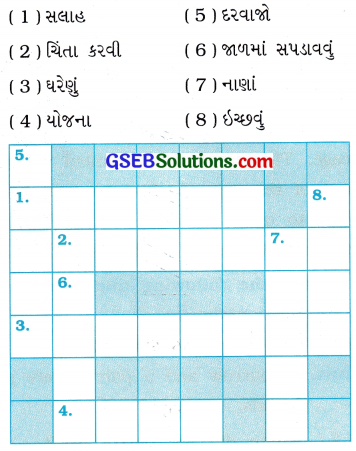
Answer:
આડી ચાવી :
(1) advice
(2) worry
(3) ornament
(4) plan
ઊભી ચાવી :
(5) gate
(6) trap
(7) money
(8) want
![]()
9. Circle the words that rhyme with the word in the box:

Word Meanings
